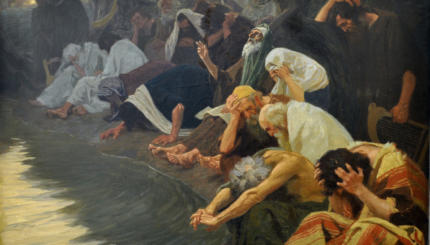Commentary on Parashat Nitzavim-Vayeilech, Deuteronomy 29:9-31:30
One of the best-recognized descriptions of the land of Israel is “a land flowing with milk and honey.” (Deut. 31:20) This description immediately conjures up a picture of a rich, fertile, and desirable land — but what do the words actually mean, and what environmental implications are alluded to in this expression?
We start with the interpretation of the Talmud, which interprets the words zavat halav u‘dvash, (flowing with milk and honey) as “milk flows from the goats’ (udders), and honey flows from the figs.” (Ketubot 111b) For a pastoral people, this indeed must have been an inviting description of the land. The goats were a source of milk as well as meat, and were very prolific. In biblical times, goats were a reflection of wealth.
The Ban on Small Livestock
How surprising then that in the land of milk and honey the Jewish sages later instituted a ban on the raising of small livestock (goats and sheep) in the land of Israel — at least in the settled areas (Mishnah Bava Kama 7:7).
Rashi, in his commentary on that Mishnah, explains that the reason for the ban against raising sheep and goats in the land of Israel was due to the mitzvah of yishuv ha‘aretz, literally settling the Land, and by extension living there in such a way that will sustain Jewish existence on the Land for an unlimited time. Although very profitable for the owner, sheep and goats are especially destructive to fields and gardens as well as other green areas.
With your help, My Jewish Learning can provide endless opportunities for learning, connection and discovery.
Clearly, in their considerations for making the ban on raising sheep and goats in the land of Israel, the sages were faced with a dilemma. On one hand they needed to consider the economic benefits to those that raised sheep and goats; on the other hand they needed to consider the environmental costs, and the injury to the farmers whose crops were being damaged by them.
The sages, in prohibiting the raising of these small livestock, chose what today might be called the ‘sustainable’ path. They ruled against inappropriate development that yields a quick profit for some but damages others, and causes extensive long-term ecological damage. They determined that this was clearly not the kind of responsible development demanded by the concept of yishuv ha’aretz.
An Automobile-Centered System
Unfortunately, one does not need to look very far today to find examples of irresponsible development in the land of Israel. One glaring example is the choice to develop an extensive automobile-based transportation system rather than a safer and more sustainable public transportation system.
As a result, many of Israel’s most populated areas suffer from terrible air pollution. Automobiles also require a lot of valuable land for roads as well as for parking, gas stations, repair shops, etc. For Israel, a small and heavily populated country, this means tangibly less land for housing, schools, parks, or other purposes that large numbers of people benefit from.
Weighing the harm caused by automobiles, including long-term ecological damage, against the short-term benefits to those who benefit, it would appear that an automobile-based transportation system does not fit well with yishuv ha’aretz. Interestingly, Rabbi Yisrael Kanievsky, one of the leaders of the previous generation, was quoted as saying that had there been a Sanhedrin (Religious High Court) in his day, they may well have forbidden the use of private automobiles in Israel.
Conditional Flowing
There are still other interpretations of the expression “flowing with milk and honey” that merit our consideration. In our portion, the mention of halav u’dvash is in a negative context: “For when I shall have brought them into the land of which I swore to their fathers, one flowing with halav u‘dvash; and they have eaten and filled themselves and grown fat; then they will turn to other gods, and serve them, and provoke me and break my covenant (Deut. 31:20).” From this verse we clearly see how the same material abundance which is such a blessing can also lead to forgetting the Creator who provided it.
This leads to the examination of one additional interpretation by Rabbi Samson Raphael Hirsch in his commentary on the expression a “land flowing with milk and honey.” Instead of focusing on the meaning of milk and honey, Rabbi Hirsch focuses on the meaning of the word for flowing (zavat), and writes:
“It is very characteristic that the abundance of produce by zov only occurs in reference to Eretz Yisrael (the land of Israel)? In Tanakh, the word zov never means overflowing. It occurs mainly to describe a human pathological condition, and otherwise as a flowing forth caused by miraculous power?It does not seem to describe a land that develops the abundance in accordance with its natural fertility, but a land that only does this under special conditions. Palestine is a hard land? which can only blossom and flourish ‘under the continuous special care of God for it, from one end of the year to the other.’ When it gets water, it blossoms luxuriously. But it only gets the water from above. It is a land that makes it necessary for its inhabitants to be good.”
Provided by Canfei Nesharim, providing Torah wisdom about the importance of protecting the environment.



